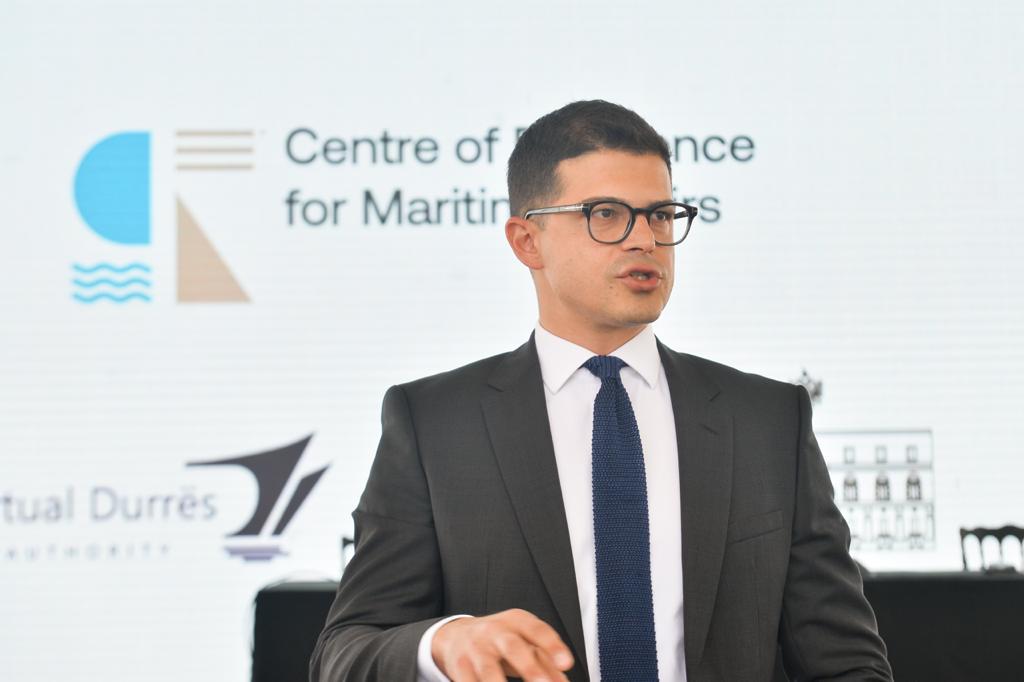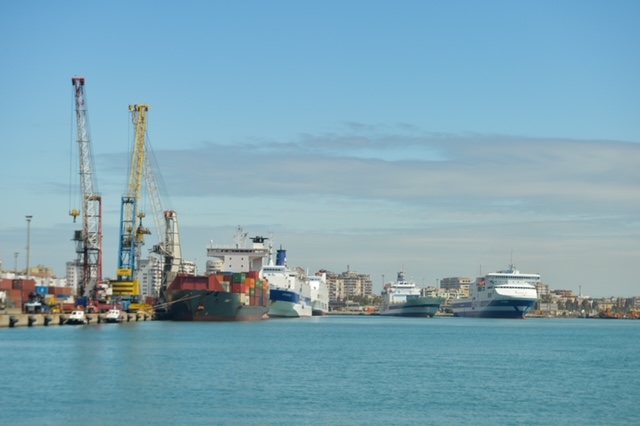Port pro of the month: Pirro Vengu (AL)
01 June 2021
In April 2021, the Port of Durrës officially joined ESPO as an observer member. It is the perfect occasion to have an interview with Mr Pirro Vengu, CEO of Durrës Port Authority, who presents his port as well as himself!

Can you briefly tell us about the Port of Durrës? What are its main characteristics and challenges?
Durrës is Albania’s oldest and largest port, which accounts for 90% of the country’s maritime trade. Our throughputs are indicators of Albania’s growing international trade and increased regional footprint in Adriatic Europe. The Port of Durrës has grown substantially over the past three years and forecasts predict further growth despite COVID disruptions. On the one hand, that’s excellent news. On the other hand, that creates also a few challenges. Bearing in mind the Port is fully surrounded by the urban fabric with limited expansion opportunities, we have been struggling to improve infrastructure, security, intermodality, logistic-related services, whilst the current port setup hinders our green transition, especially in the bulk and general cargo sector. These are the reasons why the Government of Albania has made the strategic decision to relocate the Port of Durrës in a new Port facility and return the current area back to the city.
What is your vision for the Port of Durrës for the next decade? What are the main investment projects in the coming years?
Our vision is to become a regional logistic hub. The New Port of Durrës Masterplan 2030 envisions the relocation of cargo operations in a new modern facility to be built north of the bay, in Porto Romano whilst the Old City Harbor will be dedicated to passengers, cruises and an integrated marina and real estate development. This is very similar to what so many European ports have done in the past decade, the latest example being Tallinn. We will have a total reset which will benefit both the maritime and tourism industries, new port services integrated with a logistic and energy park, as well as improved security and operations that are able to service not only Albania but also our regional clients in Kosovo, North Macedonia and Adriatic Europe as a whole.

In April 2021, the Port of Durrës joined ESPO as an observer member. What were the reasons for joining ESPO as observer member? What is the added value in your opinion of being part of an organisation like ESPO?
Joining ESPO was a natural and timely decision. Albania’s path towards EU membership (we expect accession talks to start within this year) implies that the Port of Durrës needs to keep up to speed with the latest policy and regulatory developments in the EU when it comes to maritime transport. We value ESPO’s voice in Brussels and count on the unparalleled expertise of its network of Ports to help us improve standards of operation, port governance and strengthen the Albanian maritime sector as a whole.
Albania is a candidate country for EU membership. What would be the added value of Albania’s accession to the EU for your port? What are from a ports’ perspective the main changes to make to prepare for EU membership? What is the role of the recently created Transport Community in that respect?
Clearly, the process of EU accession has had and will continue to have a major socio-economic impact on our country. EU accession talks will further consolidate Albania’s institutions, support the reform momentum of our Maritime regulators and operators, whilst helping the private sector become more competitive. The broader consolidation of rule of law will boost trade and investments, resulting in the growth of shipping and logistics industries. Going back to what I shared earlier, the relocation of the Port will help meet the new demands while ensuring safety and environmental sustainability.
The Transport Community is an international organisation in the field of mobility and transport, consisting of 33 participants – the entire EU and the six Western Balkans countries, that aims at integrating the Western Balkans’ transport markets into the EU, through the adoption and implementation of the EU legislation and by supporting projects that are connecting the Western Balkans among themselves and with the EU.
The Transport Community has developed a set of work plans for the development of TEN-T extension of the EU comprehensive and core networks to the Western Balkans, identifying priority projects of regional interest, including lately an Action-Plan for Waterborne Transport and Multimodality. More recently we have benefitted from the Transport Community’s support in setting up the Centre of Excellence for Maritime Affairs (CEMA) in Durrës. This is an instrument that will help us enhance our regional footprint as maritime services providers, improve our governance, prepare us to meet standards and obligations on Flag, Port and Coastal State matters as well as identify solutions to tackle climate change, support growth and increase resilience.
.jpg)
Looking at the maps, the Western Balkan can play an important role in enhancing the connectivity within the European Union? Could you explain further?
Absolutely - we are part of Europe, surrounded by EU Member States. So, focusing on improving transport links and integrating the logistic chain is the right approach. It benefits not only the Western Balkans and the neighboring EU countries but the entire EU. The Port of Durrës is already the port of Kosovo and to some extent of North Macedonia. So, we are already experiencing that regional dimension. Yet, we realise that with modernised port infrastructure and more capacity building, we can do better. The Transport Community Secretariat, with whom we work closely, is playing a vital role in supporting this change.
The COVID-19 crisis is having a profound impact on the European economy and society. What has been the impact of this crisis on the Port of Durrës?
The Port of Durrës has been on the frontline, first, in the aftermath of the devastating earthquake that hit Albania in November 2019, as we made sure that support and aid from our European friends reached us in a timely and efficient manner. Second, we remained operational throughout the pandemic, albeit under a strict protocol, whilst facilitating the work of all operators to ensure that their business kept going uninterrupted. It is true that the Ferry industry has been particularly hit, but there also some bright spots in terms of General Cargo and Containerised goods.
.jpg)
In order to get goods to the desired destinations, good hinterland connections to the port are of paramount importance. Can you briefly describe how the Port of Durrës is connected to its hinterland?
The Port of Durrës is located 35km away from Tirana and 25km away from Tirana International Airport. It is now partially connected to the national railway network as well as to the international Railroad to Montenegro. But we are yet to achieve full intermodality in our terminals because of the limitations of our current urban surroundings. The relocation of cargo operations will allow us to focus more on logistic areas in a free hinterland and terminal interconnections to rail and road for all types of cargo.
The Port of Durrës is important for NATO. Can you tell us why?
Albania has been a NATO member since 2009 and within that framework there have been regular exchanges with NATO officials in the ambit of international exercises or the processing of cargo for NATO relevant missions and troops in South-East Europe. But to understand the importance of the Port of Durrës suffice to notice the vital role it played as a forward base of operations for the US-led NATO exercise - Defender Europe 2021.
Due to the COVID-19 pandemic and its impact on global value and production chains, the debate on reshoring industry back to or closer to Europe and diversifying supply chains gained a new momentum. Do you think that, in time, we will see a reshoring of industry closer to Europe as well as more diversified supply chains?
Absolutely, and I think you can already see that happening. That said, I think it will not happen overnight. The global production processes will take time to reverse or reshore. And I believe it will be driven by the need to reshore certain critical sectors but not necessarily all of them. In the broader sense I concur with the idea that the post-pandemic situation can be an opportunity for short-sea transport and logistics in Europe and in the Mediterranean in particular.
.jpg)
What are the environmental priorities of the Port of Durrës?
Since 2019 we were very clear about wanting to decrease our carbon footprint in the current facility and increase environmental standards in the new port facility. Since April this year, DPA is an ISO 14001:2015 certified company for our Environmental Management System. But we want to do more by embedding environmental performance in our tariff policy and by incentivizing green solutions for port operators and shipping lines. Furthermore, our new Port of Durrës Masterplan 2030 has put a strong emphasis on green and sustainable policies in the new location of the Port of Durrës in Porto Romano.
How did you get into maritime transport? How did your career path lead to this position?
From the European Council on Foreign Relations, to Chief of Staff of the Minister of Foreign Affairs, to later becoming the Head of the Albanian Anti-Corruption Office. Hesitant to begin with but didn’t take long to appreciate and fall for maritime transport. I could hardly ever imagine a sector that is so traditional and yet so dynamic at the same time. It’s always exciting and you never get bored.
Related documents
No attachments.
